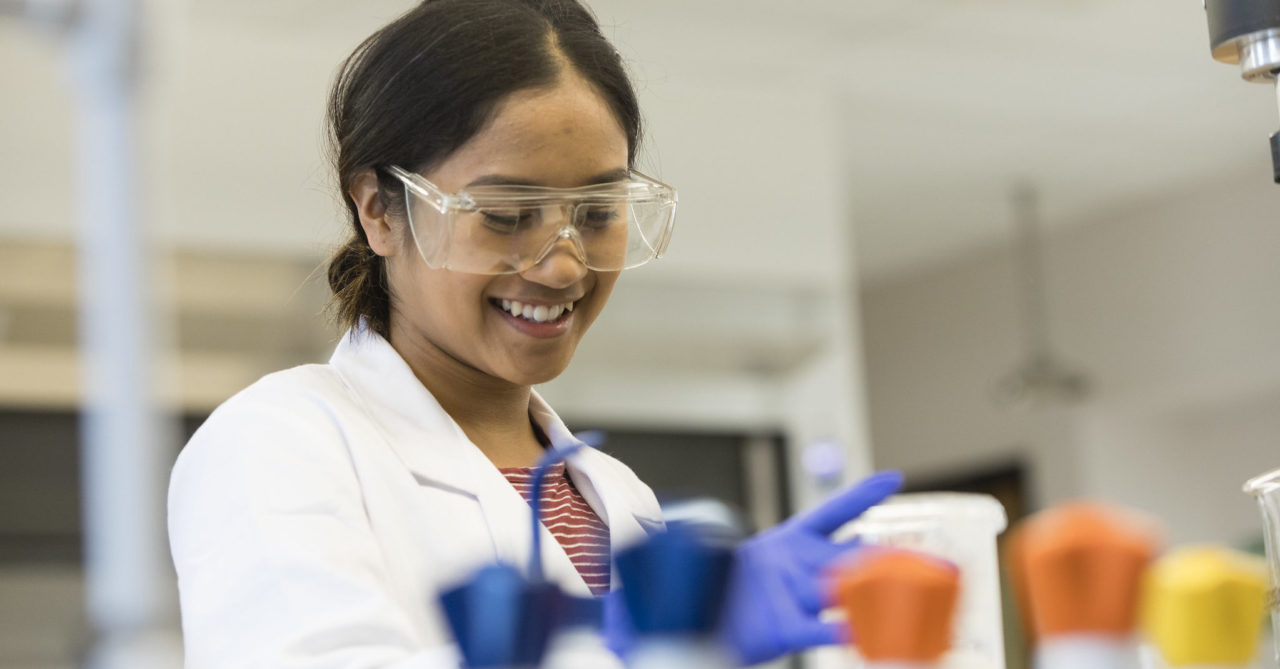Biochemistry BS

This highly interdisciplinary Bachelor of Science in Biochemistry program offers a comprehensive understanding of the chemical processes underlying life. It prepares students for success in the health professions, giving them a competitive edge for admission into pharmacy, medicine, dentistry, veterinary medicine, and physical therapy programs, while also providing critical thinking skills and foundational knowledge to excel on entrance exams like the MCAT. Additionally, it opens doors to diverse career paths in research, biotechnology, environmental science and pharmaceutical chemistry,
The biochemistry curriculum blends coursework in chemistry, biology, physics, and mathematics with electives and hands-on research, allowing students to develop expertise in chemical and biological analysis, laboratory techniques, and problem solving. Pre-professional counseling for science and health careers is available, empowering graduates to pursue varied interests and excel in a rapidly evolving scientific landscape.
Professional Certification
The BS in Biochemistry program on the Florham campus is an ACS Approved Program certified by the American Chemical Society.
Program Learning Outcomes
At the conclusion of this program, graduates will be able to:
- Demonstrate a deep understanding of biochemical vocabulary, concepts, methods, and procedures, enabling them to tackle complex scientific challenges and remain competitive in industry, graduate, and professional environments.
- Articulate biochemical concepts and research findings clearly and persuasively through both written reports and oral presentations, adapting their communication to diverse audiences.
- Proficiently locate and evaluate information from primary and secondary sources using modern digital tools, ensuring that their work is informed by the most relevant scientific literature.
- Utilize qualitative and quantitative critical reasoning methods to design experiments, interpret data, and draw evidence-based conclusions.
- Competently use standard laboratory equipment, modern instrumentation, and classical techniques to conduct experiments while adhering to proper safety protocols and regulatory guidelines for the safe handling and use of chemicals and laboratory equipment.
Degree Plan
Note: All students are required to complete the General Education Requirements of their campus in fulfillment of their Bachelor’s degree requirements.
Semesters 1 and 2
- CHEM1201 / CHEM1203 General Chemistry I Lecture / Laboratory
- CHEM1202 / CHEM1204 General Chemistry II Lecture / Laboratory
- BIOL1221 / BIOL1222 Biological Diversity Lecture / Laboratory
- BIOL1233 / BIOL1234 Introduction to Molecules, Cells and Genes Lecture / Laboratory
Semesters 3 and 4
- CHEM2261 Organic Chemistry I Lecture
- CHEM2263 Organic Chemistry I Laboratory
- CHEM2262 Organic Chemistry II Lecture
- CHEM2264 Organic Chemistry II Laboratory
Semesters 5-8
- CHEM3241 / CHEM3243 Physical Chemistry I Lecture / Laboratory
- CHEM3281 / CHEM3389 Biochemistry I Lecture / Laboratory
- BIOL3100/BIOL3101 Genetics & Lab
- CHEM3282 Biochemistry II Lecture or BIOL6733 Enzymology or relevant course as approved by the director of Biochemistry on your campus.
- BIOL3050/BIOL3051 Cell Biology & Lab
- CHEM4401 or BIOL4950 Seminar
- CHEM2221 / CHEM2223 Analytical Chemistry Lecture / Laboratory
- Major Elective I: See recommended courses for Science Electives below
- Major Elective II: See recommended courses for Science Electives below
- Major Elective III: See recommended courses for Science Electives below
Cognate Requirements
Semesters 1 and 2
- MATH1201 (Metro) or MATH1203 (Florham) Calculus I
- MATH1133 (Florham) or MATH2337 (Metro) Applied Statistics or BIOL2300 Experimental Design (Metro) or another math course as approved by the director of Biochemistry on your campus.
Semesters 3 and 4
- PHYS2203 / PHYS2201 University Physics I Lecture / Laboratory
- PHYS2204 / PHYS2202 University Physics II Lecture / Laboratory
Ethical Reasoning General Education Requirement
- PHIL1440 Biomedical Ethics
Information and Technological Literacy General Education Requirement
Major Requirements
Free Electives
May be chosen from any courses offered at the University after consultation with an advisor. Students may not take for free electives any course that is listed above as a requirement for the major.
Science Electives
Any upper-level undergraduate or graduate science course or Independent Study.
A minimum of 120 credits is required for graduation. Students must also take 220 hours of chemistry laboratory and 350 hours of laboratory in total above the introductory laboratory experiences to graduate.
Recommended Courses for Major Elective:
- BIOL3009, BIOL3019 Microbiology
- BIOL3221, BIOL3231 Microbiology – Medical Focus
- BIOL3225, BIOL3226 General Microbiology
- BIOL3332, BIOL3333 Immunology
- BIOL3345 Molecular Genetics
- BIOL3360, BIOL3361 Advanced Molecular Biology
- BIOL3408, BIOL3409 Forensic Science
- BIOL3417 Introduction to Recombinant DNA
- BIOL3420, BIOL3421 Developmental Biology
- BIOL4220, BIOL4221 Histology
- BIOL4235, BIOL4236 Developmental Biology
- BIOL4240, BIOL4241 Molecular Cell Biology
- BIOL4444 Selected Studies in Cell and Molecular Biology
- BIOL4470, BIOL4471 Introduction to Neuroscience
- BIOL4500, BIOL4501 Cell Biology Cancer
- BIOL4600, BIOL4601 Gene Expression and Regulation
- BIOL4855, BIOL4856 Molecular Biology Techniques
- BIOL6720 or BIOL4720 Molecular Biotechnology
- BIOL5306 or BIOL4306 Immunology
- BIOL6840 or BIOL4840 Cell Culture
- CHEM2211 / CHEM2213 Inorganic Chemistry Lecture and Laboratory
- CHEM3242 / CHEM3244 Physical Chemistry II Lecture and Laboratory
- CHEM4215 Advanced Inorganic Chemistry
- CHEM4263 Intro to Medicinal Chemistry
- CHEM4285 Pharmacology
- CHEM4373 Polymer Chemistry
- CHEM4430 Selected Topics in Chemistry
- CHEM2961 – CHEM4963 Mentored Research in Chemistry
- CHEM4941 Internship in Chemistry
- PHYS3400 Biophysics
- Other courses as approved by the director of Biochemistry on your campus